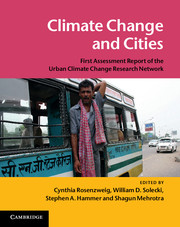Book contents
- Frontmatter
- Contents
- Foreword – Anna Tibaijuka
- Foreword – Rajendra Kumar Pachauri
- Foreword – Mayor Michael R. Bloomberg
- Foreword – Jeffrey D. Sachs
- Preface
- Executive Summary
- Part I Introduction
- Part II Defining the risk framework
- Part III Urban sectors
- Part IV Cross-cutting issues
- Conclusion: Moving forward
- Appendix A City case studies and topics in vulnerability, adaptation and mitigation
- Appendix B Acronyms and abbreviations
- Appendix C Steering Group, ARC3 authors, and reviewers
- Index
Foreword – Anna Tibaijuka
Published online by Cambridge University Press: 05 August 2012
- Frontmatter
- Contents
- Foreword – Anna Tibaijuka
- Foreword – Rajendra Kumar Pachauri
- Foreword – Mayor Michael R. Bloomberg
- Foreword – Jeffrey D. Sachs
- Preface
- Executive Summary
- Part I Introduction
- Part II Defining the risk framework
- Part III Urban sectors
- Part IV Cross-cutting issues
- Conclusion: Moving forward
- Appendix A City case studies and topics in vulnerability, adaptation and mitigation
- Appendix B Acronyms and abbreviations
- Appendix C Steering Group, ARC3 authors, and reviewers
- Index
Summary
The world rapidly urbanizing, and a majority of the global population will experience climate change in cities. Climate change will exacerbate the existing urban environmental management challenges in cities – in most cases making existing problems much worse. Additionally, it is the urban poor, who often are forced to live in flood- and landslide-prone areas and who face other vulnerabilities, who will bear a disproportionate share of the effects of climate change. Though cities are vulnerable to the effects of climate change, they are also uniquely positioned to take a global leadership role in both mitigating and adapting to it.
As cities begin to develop climate change action plans there is great need for a mechanism by which research and expert knowledge may contribute to the development and implementation of effective urban climate change policies and programs. Since responding to the complex challenges of climate change mitigation and adaptation requires a knowledge-based approach, the First UCCRN Assessment Report on Climate Change and Cities (ARC3) provides a tool for policymakers as they “mainstream” responses to climate change in urban areas.
The ARC3, a project of the Urban Climate Change Research Network (UCCRN), is innovative and important. It supports the work of local government officials and local researchers and complements the work of the already-existing body of knowledge developed by the Intergovernmental Panel on Climate Change (IPCC) by addressing the needs of cities.
- Type
- Chapter
- Information
- Climate Change and CitiesFirst Assessment Report of the Urban Climate Change Research Network, pp. viiPublisher: Cambridge University PressPrint publication year: 2011



